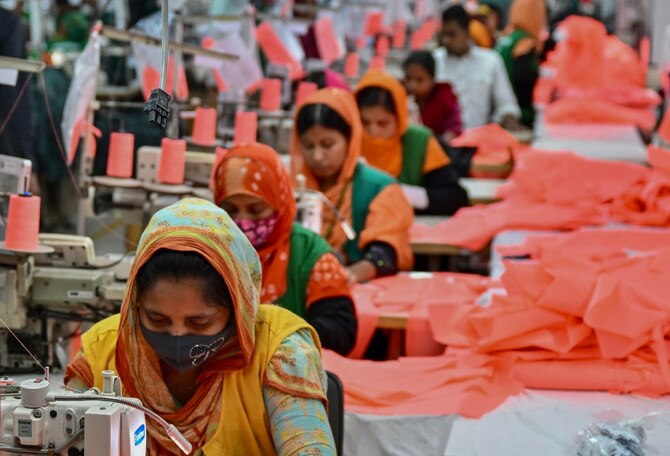DHAKA: Now a hub of cheap, mass-produced clothing for global brands, Bangladesh was for centuries known as the opposite — a center of coveted luxury textiles. The European appeal of these fine fabrics in the late 18th century marked the beginning of the industry’s decline, ultimately leading to its eventual erasure.
Historically, eastern Bengal — now Bangladesh — was renowned for its master weavers of silk and cotton textiles and particularly for muslin, a lightweight fabric crafted from extremely fine handspun yarns.
Dhaka became the center of muslin weaving in the early 17th century when the fabric became popular on the Indian subcontinent under the Mughal Empire. It dominated the global market for 200 years.
“Dhaka muslin was a symbol of tradition and royal nobility in this land. It was celebrated for its magnificent design and exceptional craftsmanship, earning worldwide acclaim. So fine was its weaving that an entire muslin sari could easily pass through a finger ring,” said Mohammad Ayub Ali, head of the muslin revival project at the Bangladesh Handloom Board, which works to preserve classical Bengali weaving techniques.
“Traders from various European countries, including England, the Netherlands, Portugal and Greece, were actively engaged in the muslin trade.”
This flourishing market was, however, soon overshadowed by colonial influence. Bengal’s textile industry began to wither after the British East India Company conquered the region in the mid-18th century, took control of the industry and exploited it beyond its limits.
In his 1772 work “Considerations on India Affairs,” merchant William Bolts of the British East India Company describes weavers being forcibly taken from their workplaces to produce textiles at English factories. Some resorted to self-mutilation — cutting of their own thumbs — in a desperate attempt to escape forced labor.
Another devastating blow to the native industry came with the tariffs imposed by the British colonial rulers, as England entered the Industrial Revolution and itself began mass-producing fabrics.
“The British rulers suppressed our local cotton producers and muslin weavers to create a favorable market for (their) textiles. Cheap textiles started to pour into our markets ... In the middle of the 19th century, muslin production in Dhaka was completely stopped,” Ali said.
“We were forced to import British clothes ... We once had 100 percent local input in cotton production, weaving and the expertise required to create world-class garments. But now, we only produce ready-made clothing as tailors.”
Bangladesh is the second-largest exporter of ready-made garments in the world, after China, producing large volumes quickly and cheaply. Around 4 million people are employed in factories, where unsafe working conditions, frequent deadly accidents and monthly wages that rarely exceed $120 regularly make headlines in both local and international press.
There is a direct link between the exploitative sector and colonial legacy.
“The colonizers systematically dismantled our thriving artisan economy ... The destruction of that heritage was not just about economics; it was about erasing a culture of excellence and self-reliance,” top Bangladeshi model and celebrated designer Bibi Russell, renowned for her efforts to revive her homeland’s textile art, told Arab News.
“While Bangladesh has become one of the largest exporters of ready-made garments in the world, we must ask ourselves at what cost. The fast fashion industry has created millions of jobs, but it has also perpetuated a system where workers are often undervalued, artisans are sidelined, and our natural resources are exploited. In many ways, it reflects a continuation of the exploitative systems of the past, where the value of human skill and creativity is sacrificed for profit.”

Bibi Russell speaks to Bangladeshi TV in December 2024. (Bibi Russell)
Russell is an advocate of the growing defashion movement, which calls for a shift away from the disposable culture of fast fashion — including its overconsumption, environmental degradation and the exploitation of workers in countries where labor laws and wages are poor.
She believes such a change is possible as the world is waking up and the global fashion landscape is changing, with consumers becoming more conscious of sustainability and ethical practices.
“Bangladesh has an incredible opportunity to lead this change ... Our history shows that we are resilient, and I see an opportunity to reclaim our legacy as a hub of quality and innovation, not just quantity,” she said.
“By investing in our craftspeople and celebrating their work, we can create an industry that uplifts rather than exploits, honors rather than erases ... This is our moment to rewrite the narrative — not as victims of a colonial legacy, but as innovators and creators.”













